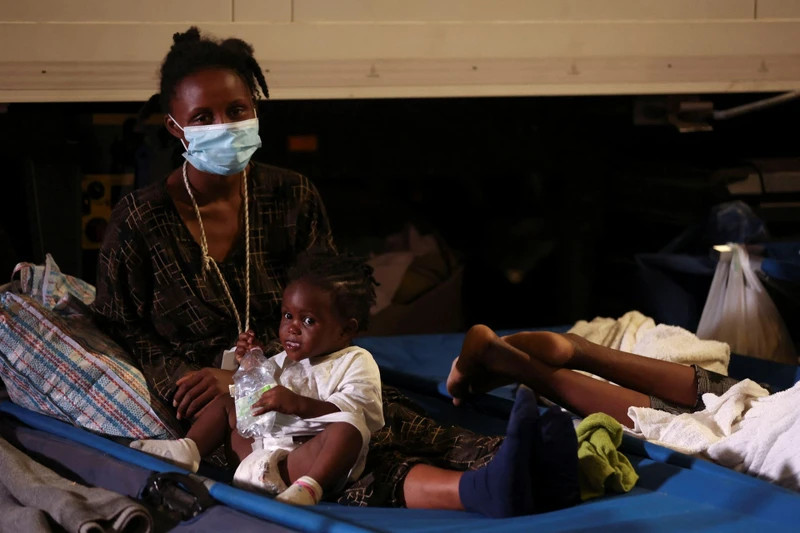As a frontline country, Italy continuously warns of a major challenge to the EU, as the number of migrants flocking to the country's Lampedusa Island is increasing.
In less than a week, from September 11 to 13, around 8,500 migrants landed on the island in 199 boats. The number of migrants exceeded the number of residents on the island.
The number of migrants on boats departing from the North African coast to Lampedusa Island has increased dramatically. In less than a week, from September 11 to 13, around 8,500 migrants landed on the island in 199 boats. The number of migrants exceeded the number of residents on the island.
Lampedusa sits in the Mediterranean between Tunisia, Malta and the larger Italian island of Sicily and is a first port of call for many migrants seeking to reach the EU. The small Italian island of Lampedusa is being overwhelmed by the number of migrants arriving on its shores.
Lampedusa officials called on the EU and the Italian state, to step in immediately with rapid support, operations and a swift transfer of people.
Nearly 126,000 migrants have arrived in Italy so far this year, almost double the figure on the same date in 2022. In current trends, arrivals are near the peak recorded in 2016, when about 181,500 sea migrants arrived in Italy.
Meanwhile, according to the United Nations High Commissioner for Refugees (UNHCR), the situation on the island of Lampedusa is "critical", following the arrival by sea of unprecedented numbers of migrants and refugees, in recent days and insisted that ensuring “adequate assistance” for the most vulnerable, must be "a priority."
It also called for the establishment of an agreed regional mechanism across the EU, for landing and redistribution procedures regarding migrants arriving in Italy by sea.
The issue of migrants is a big challenge for the Italian Government. When taking power in October 2022, Prime Minister Giorgia Meloni's administration pledged to resolve and has made efforts to improve relations with Tunisia, where most illegal migrant trains come from. In July, Tunisia and the EU signed a deal to help stem the flow of migrants, but it did not produce significant results.
Prime Minister Giorgia Meloni urged EU countries to coordinate in dealing with common challenges that risk losing control. Increasing pressure forced Italy to seek support from the United Nations. Italian Deputy Prime Minister and Minister of Foreign Affairs and International Cooperation, Antonio Tajani, maintained that immediate and extensive measures are needed to deal with the growing problem of irregular migration.
The wave of illegal migration is a challenge for the whole of Europe, so a common response from the entire bloc is needed.
President of the European Commission
Ursula von der Leyen
Europe's biggest difficulty today is preventing migrants by sea. President of the European Commission (EC) Ursula von der Leyen said, that irregular migration is a European challenge and it needs a European answer. She called on EU members to accept refugee quotas to share the burden of countries like Italy.
Germany has decided to keep taking in migrants and refugees arriving in Italy, two days after it announced the suspension of a voluntary agreement with Rome to receive new arrivals.
As part of an EU scheme, known as the voluntary solidarity mechanism, Germany pledged to take in 3,500 asylum seekers from countries on the bloc’s external borders, that have been hardest hit by the most recent wave of migration. So far, Germany has accepted more than 1,700 people under the scheme, which was launched last June.
Not only a European problem, preventing illegal migration is also a problem for many regions around the world. Messy and disorderly migration along dangerous routes, that human traffickers take advantage of, continues to cause major consequences, in which the highest cost is life. If poorly managed, migration can increase divisions within society and between communities.
Secretary-General António Guterres credited more than 80 per cent of those who cross borders in a safe and orderly fashion, as powerful drivers of “economic growth, dynamism, and understanding”.
However, illegal migration is an urgent problem that needs to be resolved and requires close coordination between countries, international organisations and communities.
















